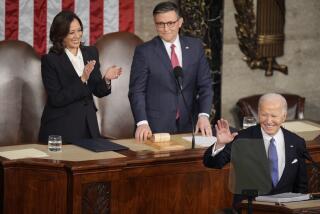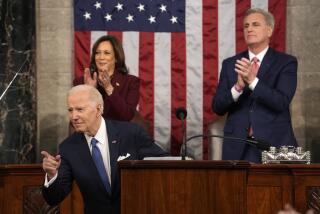Bush’s Whys for War
- Share via
There was an initial unreal quality about President Bush’s State of the Union address Tuesday evening. The president talked about a prescription drug program, medical liability reform, deep tax cuts portrayed as painless rebates -- all before getting to the topic on everyone’s mind: whether the nation is going to war. But when he got to the key issue, he minced no words, attempting to link the threat of Saddam Hussein to the continued safe existence of the United States.
Bush noted the doubts of many Americans -- and citizens of other nations -- that Hussein poses an imminent threat. That changed on 9/11, the president said. Imagine the 19 hijackers “with other weapons, and other plans,” armed by Hussein with a vial, canister or crate of biological, chemical or radiological weapons, slipping into this country “to bring a day of horror like none we have ever known.”
Bush said Hussein protects members of Al Qaeda, an assertion others dispute. The Al Qaeda tie is critical to Bush’s argument for war and needs more fleshing out to be persuasive. The president also cited intelligence sources and defectors in saying again that Iraq has mobile biological weapons laboratories and is trying to develop nuclear weapons.
He said repeatedly, powerfully, that Hussein has given no evidence that he has destroyed the material Iraq was known to possess, material capable of producing enough anthrax to kill millions of people, botulinum toxin that can kill millions more and nerve gas.
Bush detailed Iraq’s use of torture, possession of fearsome weapons and refusal to comply with 12 years of U.N. demands that it disarm. The president said Secretary of State Colin L. Powell next week would give the United Nations Security Council “information and intelligence” about Iraqi weapons programs, the attempts to hide them and links to terrorist groups.
Powell will have the difficult job of persuading reluctant nations to back a multilateral military action against Baghdad if that becomes necessary. However, the president again held open the possibility of the nation acting without U.N. consent.
Bush attempted to dismiss the notion that U.N. inspectors needed to produce a “smoking gun” to justify further action against Iraq. It is Hussein, he said repeatedly, who has “given no evidence.”
In seeking to corral the support of the American public, the president sought to make an emotional connection between the 9/11 tragedy and going after Hussein. The rhetoric worked. But many facts remain to be filled in. Bush built a foundation Tuesday, but he left a lot of hammering, sawing and nailing to be done by Powell.
More to Read
Sign up for Essential California
The most important California stories and recommendations in your inbox every morning.
You may occasionally receive promotional content from the Los Angeles Times.










